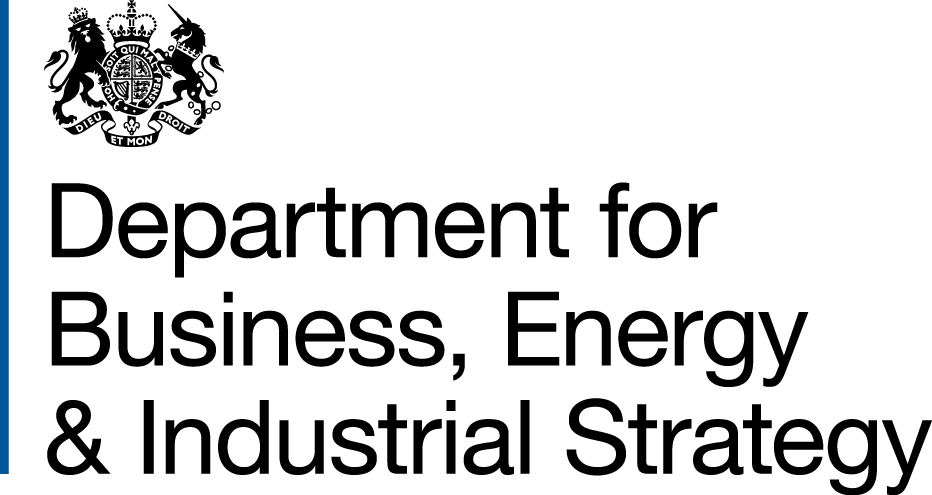Jump to section
The Rt Hon Anne-Marie Trevelyan MP
Department of Business Energy and Industrial Strategy / Minister for Energy, Clean Growth and Climate Change
The Rt Hon Anne-Marie Trevelyan MP
Department of Business Energy and Industrial Strategy / Minister for Energy, Clean Growth and Climate Change
Anne-Marie Trevelyan was appointed as Minister of State (Minister for Energy, Clean Growth and Climate Change) at the Department of Business, Energy and Industrial Strategy on 8 January 2021.
Anne-Marie Trevelyan was appointed as the UK International Champion on Adaptation and Resilience for the COP26 Presidency on 7 November 2020.
Previously Anne-Marie was the Secretary of State for International Development from February to September 2020. She was Minister of State for the Armed Forces from 17 December 2019 to 13 February 2020, and Minister for Defence Procurement from 27 July 2019 to 16 December 2019.
Anne-Marie was first elected as Member of Parliament (MP) for the Berwick-upon-Tweed constituency at the 2015 general election.
A chartered accountant by trade, Anne-Marie sat on the House of Commons’ Public Accounts Committee from July 2015 to May 2017 and December 2018 to July 2019. She has previously served as the Parliamentary Private Secretary to the Secretary of State for Defence. As an MP, she has campaigned with colleagues for greater autism awareness and has focused on the Armed Forces Covenant.
Her wider interests involve spending time with her family, making the most of the incredible landscape her vast and varied constituency affords and putting her passion for singing to good use by taking part in Singing for Syrians concerts in Westminster.
Gareth Miller
Cornwall Insight / CEO
Gareth Miller
Cornwall Insight / CEO
Gareth Miller is Cornwall Insight’s Chief Executive Officer. He has worked in the energy sector in a variety of Director level client, transaction, investment, project and leadership roles, first as head of energy project finance for a global bank, then as a senior policy advisor to the UK government focusing on making policy investable, as a consultant to a variety of energy sector actors, and finally as the leader for a rapidly expanding energy analysis, research and consulting business.
At Cornwall Insight Gareth:
led the evolution and expansion of the Cornwall Insight business in GB, and into Ireland and Australia
has also advised numerous clients across the energy sector, including international players in the market, investors, and governments and is thought of as one of the leading voices in the industry on key market developments.
Gareth has extensive knowledge and experience in the commercial landscape and investment aspects of the energy industry. His skills include strategy formation and operationalisation, commercial due diligence, lead negotiation, investment appraisal, energy policy development and evaluation. As well as extensive work in the UK, he has international experience in the Irish, Italian and South African energy markets.
Jonathan Brearley
OFGEM / CEO
Jonathan Brearley
OFGEM / CEO
Jonathan Brearley became Ofgem’s Chief Executive Officer on 3 February 2020. This follows his previous appointment as our Executive Director for Systems and Networks in April 2018.
He has wide-ranging energy sector experience, having led Electricity Market Reform as the Director for Energy Markets and Networks at DECC. Prior to this, he was Director of the Office of Climate Change, a cross-government strategy unit focussed on climate change and energy issues, where he led the development of the Climate Change Act. Earlier in his career, Jonathan was a senior adviser in the Prime Minister’s Strategy Unit.
He holds a Bachelor’s degree in Mathematics and Physics from Glasgow University and a Master’s degree in Economics from the University of Cambridge.
Dr James Richardson
National Infrastructure Commission / Chief Economist
Dr James Richardson
National Infrastructure Commission / Chief Economist
James Richardson has been Chief Economist at the National Infrastructure Commission since April 2016. The NIC is an independent body, providing expert advice to the Government on long-term infrastructure strategy. James heads the NIC secretariat’s economics team and led on production of the UK’s first ever National Infrastructure Assessment, an in-depth assessment of the UK’s major infrastructure needs on a 30-year time horizon.
Prior to this, James was Director, Fiscal and Deputy Chief Economic Adviser at HM Treasury from July 2012 to March 2016 and Director, Public Spending and Chief Microeconomist at HM Treasury from September 2008 to July 2012.
James sits on the Ofgem RIIO2 Challenge Group and was formerly a member of the Economic and Social Research Council.
James has a PhD in economics from the London School of Economics (LSE).
Jenny Hill
Committee on Climate Change / Head of Buildings and International Action
Jenny Hill
Committee on Climate Change / Head of Buildings and International Action
Jenny leads the Committee’s buildings work programme, alongside its international work in the run up to COP26. She has over ten years’ experience developing technical policy advice on decarbonisation, advising the UK Government, European Commission and UK Local Government. Her focus is low-carbon energy strategy and policy development, with specialisms on energy efficiency and heat technology, costs and policy. In recent years, she has focussed in particular on how to design policy in a way which is fair and transparent, particularly for the more difficult to decarbonise parts of the energy system. She has led several CCC teams in recent years, including the work on industry and the team which produced the report Biomass in a low-carbon economy, which covers global land use and forestry projections, fuel-switching and carbon removals. She is a consultant by background, working across environmental policy and urban regeneration.
Dr Maureen Paul
OFGEM / Interim Chief Economist
Dr Maureen Paul
OFGEM / Interim Chief Economist
Dr Maureen Paul is interim Chief Economist at OFGEM. She oversees a portfolio of work that builds internal and external understanding of how well the retail and wholesale energy markets are working. She is also responsible for developing and providing transparency of the impact that Ofgem’s decisions have for consumers and the burdens that these decisions place on business. Before joining Ofgem, Maureen worked with the Competition Commission and the Office of Fair Trading on a number of market studies, Competition Act cases and mergers cases. She has a PhD in economics from the University of Warwick. Her research has been published in a leading economics journal, was the subject of national radio discussions and received coverage in a number of well-known national and international newspapers, forming the basis of a Cabinet Office roundtable on pay transparency.
Wen-Yu Weng
FTI Consulting / Senior Consultant
Wen-Yu Weng
FTI Consulting / Senior Consultant
Wen-Yu Weng is a Senior Consultant at FTI Consulting’s Global Energy Transition Practice, with a particular focus on Clean Energy. She works across a wide range of strategic, commercial, economic, financial, technical and regulatory issues, with a goal to facilitate the required transition towards Net Zero across policy, energy, mobility and infrastructure. Wen-Yu works with governments on trade policies and agreements in the energy space, and is an experienced researcher in the application of blockchain and other digital/virtual technologies in energy, infrastructure and mobility.
Mark Andrew
Amber Infrastructure / Technical Lead
Mark Andrew
Amber Infrastructure / Technical Lead
I am a Chartered Mechanical Engineer (IMechE) who is the current Technical Lead at Amber Infrastructure where we manage several Low Carbon Public Sector Funds, in particular The Mayor of London’s Energy Efficiency Fund (MEEF). Previously to working for Amber I worked for Bouygues Energies and Services as Contracts Manager where we implemented Energy Performance Contracts under RE:FIT and was an Engineering developer for large scale Solar PV installations. And before that I was at BAE Systems as part of their Energy Solutions team implementing carbon reduction schemes for both BAE Systems and the MOD.
Helena Anderson
Ikigai / Co-Founder and COO
Helena Anderson
Ikigai / Co-Founder and COO
Helena founded Ikigai Capital in December 2017 after two years at the UK Department for International Trade, where she was head of energy capital investment. At the Department for International Trade, she was responsible for shaping Government policy-aligned, private sector led, energy and integrated energy, transport and regeneration projects, businesses and technologies such that they became bankable and attracting international investment into those opportunities, working on a X-Government and local authority basis.
Prior to joining Government, Helena had 10 years’ experience as a project finance lawyer at Herbert Smith Freehills, advising on renewables, oil & gas, telecoms and infrastructure in EMEA. She was recognised by Legal 500 2016 as a leading lawyer in renewable energy projects and as an industry expert in managing environmental and social risk lending under the Equator Principles.
Helena is also a Non-Executive Director on the regulated board of the largest social housing and regeneration company in the UK, Places for People.
Anna Moss
Cornwall Insight / Head of Consumer Markets Team
Anna Moss
Cornwall Insight / Head of Consumer Markets Team
Anna leads Cornwall Insight’s Consumer Markets team, managing and developing research in the supply sector. Anna works with a range of market participants, from new entrants to large brands, providing support in strategy development, knowledge and learning and ensuring a smooth delivery of services.
At Cornwall Insight Anna has:
- Worked with TPIs and suppliers across the domestic and non-domestic sectors to discuss the key themes from our research
- Been involved in training and consultancy work in the retail sector
- Worked on bespoke studies covering due diligence, market intervention and new market entry
Anna joined Cornwall Insight in June 2013 after graduating from the University of East Anglia with a BSc in Environmental Sciences with a Year in Industry. Previous work experience includes working on small scale renewables at the feasibility study stage.
Laura Sandys
Challenging Ideas / CEO
Laura Sandys
Challenging Ideas / CEO
Laura Sandys CBE is a Senior Independent Director at SGN Network and the Energy Systems Catapult. She is Chair of the Northern Ireland Expert Panel on Energy Transition and was Chair of the BEIS/Ofgem Energy System Data Taskforce. She was appointed as a member of the Advisory Panel for the Government’s Cost of Energy Review, and is on the Council for Carbon Capture Utilisation and Storage.
She is founder of the Food Foundation and co-founder of POWERful Women, a Visiting Senior Fellow at Kings College, a member of the Carbon Tracker Advisory Board and former Deputy Chair of the Food Standards Agency.
She was previously a Member of Parliament for South Thanet, a member of the Energy and Climate Change Select Committee, and Parliamentary Private Secretary to the Minister for Energy and Climate Change. Described by The Times as ‘one of the sanest of all MPs’ and as ‘lateral-minded, original and free-thinking’.
Spencer Dale
BP plc / Chief Economist
Spencer Dale
BP plc / Chief Economist
Spencer Dale is group chief economist of bp plc. He manages bp’s economics and energy insights team which provides advice and analysis on the global energy system, the energy transition and the evolving nature of the energy system as it moves to net zero. The economics and energy insights team are responsible for producing bp’s annual Statistical Review of World Energy and bp’s Energy Outlook.
Spencer Dale joined bp as group chief economist in October 2014. Prior to that, he was executive director for financial stability at the Bank of England and a member of the Financial Policy Committee. Between 2008 and 2014, Spencer was chief economist of the Bank of England and a member of the Monetary Policy Committee. Spencer joined the Bank of England in 1989 and served in numerous roles, including private secretary to Mervyn King and head of economic forecasting. Spencer served as a senior advisor at the US Federal Reserve Board of Governors between 2006 and 2008.
He was educated at the University of Wales, gaining a BSc in Economics in 1988 and at the University of Warwick, gaining an MSc in Economics in 1989, whereupon he immediately joined the Bank of England.
Richard Bruce
Dept for Transport / Director of Energy, Technology and Innovation
Richard Bruce
Dept for Transport / Director of Energy, Technology and Innovation
Richard was appointed Director of Energy, Technology and Innovation at the UK’s Department for Transport in August 2016. He leads on policy to move the nation’s road transport onto a more sustainable footing, and maximising the economic opportunities for the UK from the move to future mobility. He is the lead Director for the UK Government’s Future of Mobility Grand Challenge, part of the UK’s Industrial Strategy.
His teams direct and deliver UK-wide policies and programmes worth around £1bn on low and ultra-low emission vehicles, low carbon fuels, air quality, putting innovative new technology on the roads, overseeing related Government R&D expenditure and international negotiation of regulations on vehicle safety and emissions. There is a particular current focus on creating an attractive regulatory and R&D environment for connected and automated vehicle technology in the UK and on making the UK the best place in the world to do transport digitally.
Prior to this role Richard spent four years as head of the UK’s Office of Low Emissions Vehicles (OLEV), delivering Government support for the early market for ultra-low emission vehicles and overseeing a period of unprecedented growth in plug-in vehicle uptake. Richard has also held various roles in the UK Senior Civil Service including DfT’s head of Corporate Governance, leading on smart and integrated ticketing; and as Director of Regional Resilience.
Before joining the civil service he worked at Unilever and at Andersen Consulting. Richard has BA in Industrial Economics and MPhil in the economics of motor vehicle pollution from the University Of Nottingham. Richard is married with two children and lives in London. He gets around by bicycle, Nissan Leaf and campervan.
Prof Jillian Anable
Institute for Transport Studies, University of Leeds / Professor of Transport and Energy
Prof Jillian Anable
Institute for Transport Studies, University of Leeds / Professor of Transport and Energy
Jillian Anable is Professor of Transport and Energy at the Institute for Transport Studies, University of Leeds. Her research addresses the potential for demand-side solutions to reduce carbon, local emissions and energy from transport. She has researched car purchasing behaviour with expert knowledge on the uptake patterns of alternatively fuelled vehicles. She has also applied socio-psychological theories and methods to evaluate policy interventions at local and national scales designed to influence private and business travel behaviour, including ‘Smarter Choices’ interventions. She has authored or co-authored over 60 academic peer-reviewed journal articles and research reports with projects mainly funded by UK Research Councils (RCUK), the Energy Technologies Institute, the UK Department for Transport, Scottish Government and the European Union. She has sat on a number of advisory boards and strategy panels for UK Government Departments, National Research Councils and NGOs, including currently acting as Chair to the Research and Evidence Group for the Scottish National Transport Strategy Review. She is a founding editorial board member on the journal Energy Efficiency.
Fiona Howarth
Octopus Electric Vehicles / CEO
Fiona Howarth
Octopus Electric Vehicles / CEO
Fiona is CEO of Octopus Electric Vehicles – an electric vehicle leasing business helping individuals and businesses transition to clean transport. With a passion for renewable energy, fantastic cars and using tech to create great customer experiences, this is absolutely Fiona’s dream job!
Since launching Octopus EV, part of Octopus Energy Group – Fiona has led the team in bringing together everything an EV driver needs – from great rates on the cars, smart charging tech and green energy tariffs designed for EV drivers – supported by a team of passionate EV experts that run EV experience events across the UK for communities and businesses.
Fiona holds an MEng from Oxford University and spent her early career at Dyson and BMW – including working on hydrogen powered cars. She has since worked in energy and connected homes tech with Bain & Company, DECC (now BEIS), before joining British Connected Homes start up AlertMe. A move to British Gas, saw her take Hive, by British Gas, from a tech pilot to a household name that today has more than one million customers
Chris Stark
Committee on Climate Change / CEO
Chris Stark
Committee on Climate Change / CEO
Chris Stark is the Chief Executive of the UK Committee on Climate Change (CCC), the public body tasked by the Climate Change Act to be the independent authority on tackling climate change. Chris leads a team of analysts and specialists, offering expert insight into the challenges of reducing UK emissions and adapting to the changing climate.
Chris led the CCC’s work in 2019 to recommend a new ‘Net Zero’ target for the UK – now brought into law. He speaks regularly on the transition to a zero carbon economy and the need to confront climate change with urgency.
Chris has wide experience in government. He has designed economic policy in Whitehall, including in HM Treasury and the former Department for Business, Innovation and Skills. He was previously Director of Energy and Climate Change in the Scottish Government, leading the development of the Scottish energy and climate strategies.
Rebecca Sedler
EDF Energy / Corporate Policy & Regulation Director
Rebecca Sedler
EDF Energy / Corporate Policy & Regulation Director
Rebecca Sedler is the Corporate Policy & Regulation Director at EDF in the UK, responsible for developing strategy and policy across its businesses including Customers, Nuclear and Renewables.
Having built a career in energy since leaving university, Rebecca is passionate about decarbonisation, the associated energy transition and customer advocacy. Prior to EDF, Rebecca worked at E.ON within energy trading, leading business change initiatives and also internationally on strategic projects.
In 2011, Rebecca joined EDF in Energy Market and Credit Risk and went on to lead the B2B business which included renewables PPAs and energy solutions. A fervent advocate of diversity and inclusion, Rebecca is a founder of the Women In Utilities Network (WUN) which now has 2000 members. Rebecca is married with three young children and spends her free time with her family, travelling to new places, cooking and endlessly tidying up toys!
Filippo Gaddo
Arup / Head of Economics
Filippo Gaddo
Arup / Head of Economics
Filippo Gaddo leads the Business & Investor Advisory Team and is Head of Economics globally at Arup. He has twenty years’ professional experience working for Government departments and major consulting firms. Filippo has led a number of major energy investment projects’ assessments as part of regulated assets transactions in the energy and water sectors, for example supporting companies in the acquisition of power, gas and heat distribution companies.
Filippo has also worked with utilities, energy companies and government departments across the world in the development, design and assessment of market mechanisms, tariff structure and new commercial / business models – for example supporting Government and Ofgem in the design of UK mechanisms and regulations.
Sponsors
Gold Sponsor
Silver Sponsors










Post your comments and questions for the speakers here